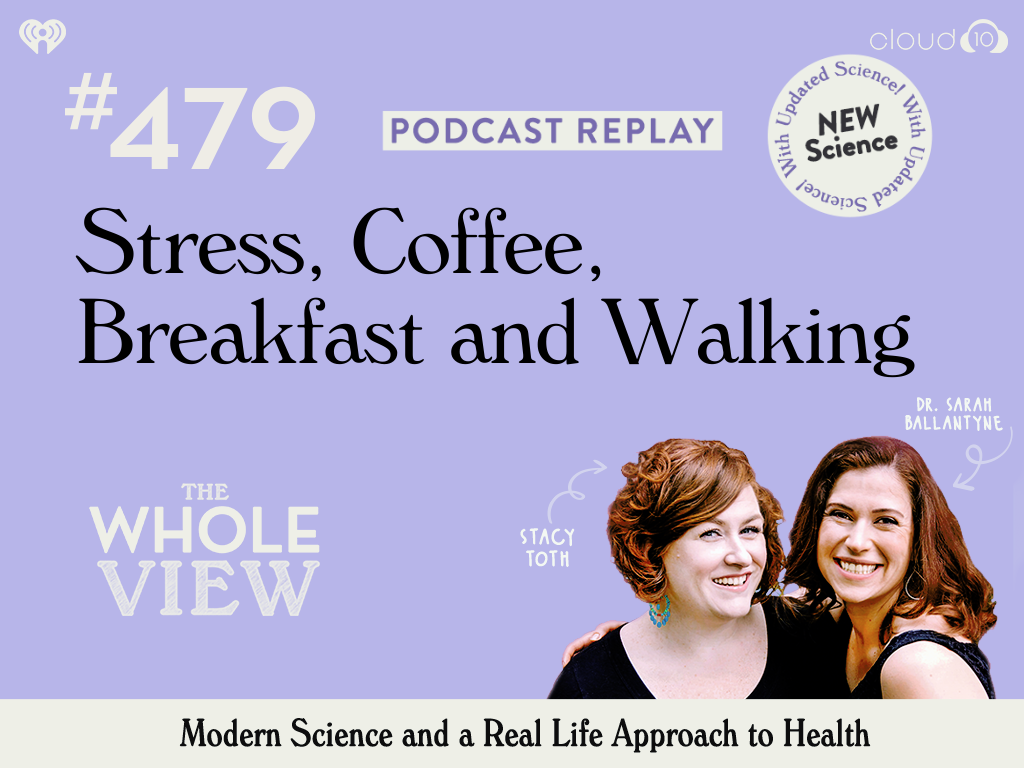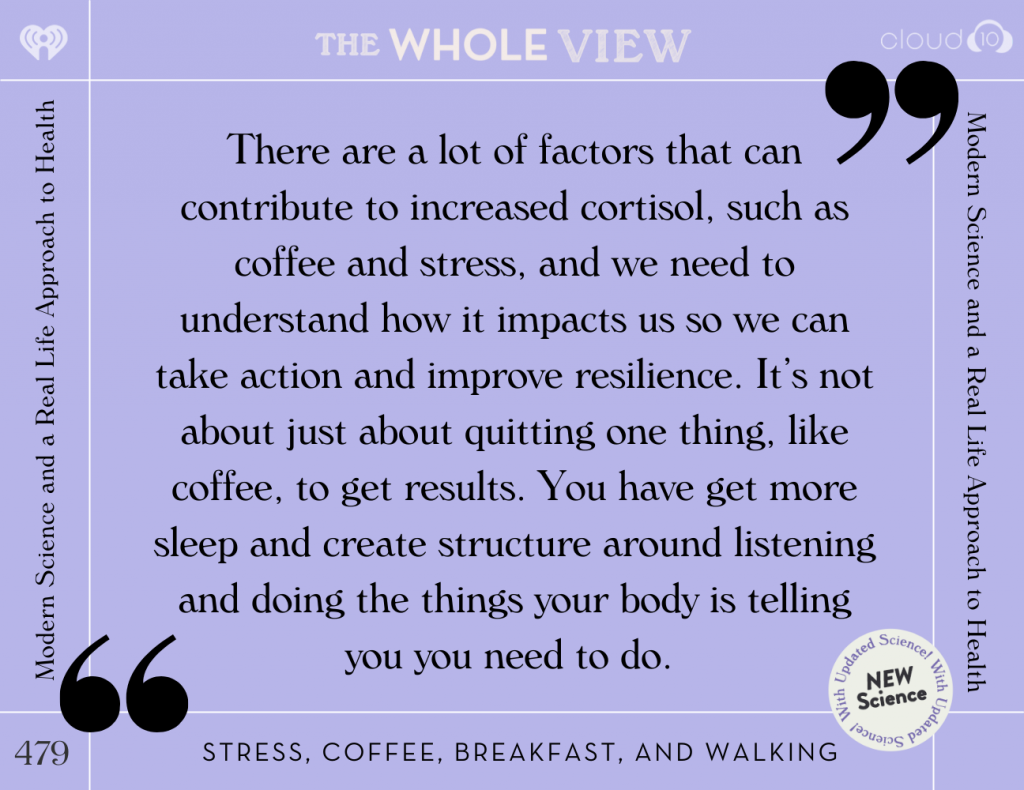 Welcome to episode 479 of The Whole View! This week, Stacy and Dr, Sarah revisit a past episode with updated science. First, they dive into the science behind stress, coffee, breakfast, and walking to determine the effects Cortisol has on our bodies. Then Stacy shares some personal updates on her health journey and what she’s done to feel better and improve her health.
Welcome to episode 479 of The Whole View! This week, Stacy and Dr, Sarah revisit a past episode with updated science. First, they dive into the science behind stress, coffee, breakfast, and walking to determine the effects Cortisol has on our bodies. Then Stacy shares some personal updates on her health journey and what she’s done to feel better and improve her health.
If you enjoy the show, please review it on iTunes!
The Whole View, Episode 479: Stress, Coffee, Breakfast, and Walking
Welcome back to episode 479! (3:19)
This episode is a re-share of Episode 351 with updated science! For previous notes on this episode, visit the previous post here.
So, let’s replay our previous episode where Stacy and Dr. Sarah dove into how chronic stress impacts health. Then, when we come back, Stacy will share what she did to finally get your cortisol in a normal range!
Other Relevant Episodes
- 453: Should We Eat Breakfast Before 8:30 am?
- 379: Let’s Talk About Coffee
- 446: Nutrient Deficiencies Caused by Stress
- 397: Practical Tips for the Sleep Stress Cycle
- 460: How to Break the Stress-Flare-Antibiotic Cycle
- 458: Collective Trauma and Re-Entry Anxiety
- 432: Giving Thanks (mindfulness and gratitude)
- 447: Basic Needs Don’t Count as Self-Care
- 469: Insulin Sensitivity vs. Lifestyle
- 339: Healthiest Houseplants that Detoxify and Purify Our Air
- 267: The Benefits of Nature
Stress, Coffee, Breakfast and Walking | Updated
Read more: Stress Undermines Health and Chronic Stress Leads to Hormone Imbalance.
The hypothalamic-pituitary-adrenocortical (HPA) axis is responsible for the flight-or-fight response—that is, how the body responds to stress.
It is made up of the complex communication among three organs:
- The hypothalamus: The part of the brain located just above the brain stem that is responsible for a variety of activities of the autonomic nervous system, such as regulating body temperature, hunger, thirst, fatigue, sleep, and circadian rhythms
- The pituitary gland: A pea-shaped gland located below the hypothalamus that secretes a variety of important hormones, such as thyroid-stimulating hormone, human growth hormone, and adrenocorticotropic hormone
- The adrenal glands: Small, conical organs on top of the kidneys that secrete a variety of hormones, such as cortisol, epinephrine (also known as adrenaline), norepinephrine, and androgens
HPA Axis
- The hypothalamus receives signals from the hippocampus
- releases corticotrophin-releasing hormone (CRH)
- signals to the pituitary gland to release adrenocorticotropic hormone (ACTH)
- signals to the adrenal glands to secrete cortisol and catecholamines (like adrenaline).
- Cortisol also provides negative feedback to the pituitary and the hypothalamus.
Cortisol has a huge range of effects in the body, including:
- controlling metabolism (thyroid function)
- Digestion
- Gut microbiome
- affecting insulin sensitivity
- Sex hormones
- Growth hormone
- Bone remodeling
- Kidney function
- immune system
- controlling blood flow
- CNS (problem-solving)
Fight or flight prioritizes:
- Perception
- Decision-making
- energy for our muscles
- preparation for wound healing
Fight or flight inhibits
- nonessential functions
- Digestion
- kidney function
- reproductive functions
- Growth
- collagen production
- bone formation
- Protein synthesis
- Amino acid uptake by muscle
- It also affects regions of the brain that control mood, motivation, fear.
Chronic stress (via cortisol, cortisol resistance, CRH)
- Increases inflammation while reducing immune function
- Causes leaky gut and gut dysbiosis
- Reduces sleep quality, dysregulates circadian rhythms
- Mood, depression, anxiety
- Increases hunger, cravings, addiction
- Hinders productivity, problem-solving, memory…
- Causes insulin resistance
- Sex hormone imbalances
Stacy’s Journey with Stress, Coffee, Breakfast, and Walking
Stacy recently took a urine test that came back with results of low Magnesium and vitamin C, as well as high cortisol levels. (1:02:45)
Also, she realized the effect that coffee has had on her and has since worked on cutting back.
With Stacy leaving Corporate America and having less stress, she’s seen multiple health improvements.
She’s also started mindfulness and breathing practice, actively seeking self-care and focusing on diet.
Managing four children while working from home throughout the pandemic was not something she anticipated. Not to mention, she became a foster family in 2020, which meant she took on the additional stress of foster and trauma training.
What she was already doing for stress management wasn’t enough, so she decided to get to the root of the problem.
After Stacy received the results, she decided to make additional changes to her life to feel better.
Lifestyle Factors
When Stacy told Dr. Sarah she planned to work on her Cortisol levels, Sarah informed her she wouldn’t start seeing results in 3-4 months. (1:13:45)
Stacy was very thankful for that because she’s not convinced she would have stuck with it if she didn’t know that. Additionally, there was no tapering off of her levels. Instead, her cortisol just dropped one day.
Sleep was a very high priority for Stacy throughout this process. They talked about the sleep-stress cycle in episode 397 and how sleep and stress are so intertwined.
When we sleep on a predictable schedule, our bodies know what’s happening and better regulate hormone fluctuations.
As she made these changes, she gradually felt more clarity throughout her day. As a result, she gets up on her own at the same time every day.
It’s not just about quitting coffee, however. You have to listen to your body, get more sleep, and create structure around listening and doing the things your body says you need to do to feel better.
Why Coffee?
Coffee can magnify the stress response and increase Cortisol spikes. Additionally, some people will have anti-inflammatory while others with have an inflammatory reaction to it.
When we drink coffee in the morning, it suppresses our appetite, which raises cortisol even more.
Dr. Sarah also quit coffee, and she notes it took her about a year for her body to start crazing breakfast in the morning. It takes dedication and understanding.
We want a cortisol spike in the morning, but we don’t want it to be too high and stay high for a long time. So food aversion in the morning, for example, is a sign of elevated cortisol.
Keep in mind this doesn’t mean you have to give up coffee forever!
Final Thoughts
If you enjoyed this show, we invite you to join Stacy and Dr. Sarah over on Patreon for exclusive behind-the-scenes content about how Stacy and Sarah feel about the topics they discuss. Your subscription goes to support this show and gets you direct access to Stacy and Sarah.
We invite you to subscribe to this channel and the realeverything.com and thepaleomom.com blogs and newsletters.
Thanks so much for listened and we will see you next week!
Want more info on our Real Life? Healthy recipes, parenting tips, and general lifestyle stuff goes out in our Real Everything newsletter, join here.
Never want to miss a post, sale, or deal? Join my Healthy Inside & Out e-mail list for more info on non-toxic living and safer skincare!





